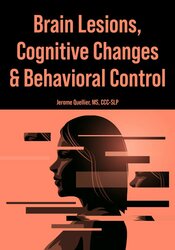
×

Patient loads and work expectations ever increase. Maximizing knowledge of neuroanatomy and dysfunction will assist in the selection of the most appropriate tests and programs to target challenges to patient progress. This session has been specifically designed to dive into site-specific changes within the brain that affect behavior and thinking skills. Being able to predict patient barriers to engagement and compliance also helps clinicians to train to each patient’s individual needs. Through a comprehensive discussion across disciplines, this course will highlight the essentials every clinician needs to confidently face their cognitively impaired client.
All members of the PESI, Inc. planning committee have provided disclosures of financial relationships with ineligible organizations and any relevant non-financial relationships prior to planning content for this activity. None of the committee members had relevant financial relationships with ineligible companies or other potentially biasing relationships to disclose to learners. For speaker disclosures, please see the faculty biography.
NOTE: Tuition includes one free CE Certificate (participant will be able to print the certificate of completion after passing the online post-test (80% passing score) and completing the evaluation). Instructional methods will include PowerPoint, didactic lecture, and others.
Continuing Education Information: Listed below are the continuing education credit(s) currently available for this non-interactive self-study package. Program content is reviewed periodically per accrediting board rules for currency and appropriateness for credit. Credit approvals are subject to change. Please note, your licensing board dictates whether self-study is an acceptable form of continuing education, as well as which credit types are acceptable for continuing education hours. Please refer to your licensing board's rules and regulations. If your profession is not listed, please contact your licensing board to determine your continuing education requirements and check for reciprocal approval.
For other credit inquiries not specified below, please contact info@pesi.com or 800-844-8260 before purchase.
Materials that are included in this course may include interventions and modalities that are beyond the authorized practice of your profession. As a licensed professional, you are responsible for reviewing the scope of practice, including activities that are defined in law as beyond the boundaries of practice in accordance with and in compliance with your profession's standards.
For Planning Committee disclosures, please see the statement above. For speaker disclosures, please see the faculty biography.
Earn up to 1.0 CE hours. Please see below, for more details, as credit amounts vary by jurisdiction and profession.

PESI, Inc., #1062, is approved as an ACE provider to offer social work continuing education by the Association of Social Work Boards (ASWB) Approved Continuing Education (ACE) program. Regulatory boards are the final authority on courses accepted for continuing education credit. ACE provider approval period: January 27, 2023 - January 27, 2026. Social workers completing this course receive 1.0 Clinical continuing education credits.
Course Level: Intermediate Format: Recorded asynchronous distance. Full attendance is required; no partial credits will be offered for partial attendance.
Canadian Social Workers: Canadian provinces may accept activities approved by the ASWB for ongoing professional development.
This self-study activity qualifies for 1.0 continuing education clock hours as required by many national, state and local licensing boards and professional organizations. Save your activity advertisement and certificate of completion, and contact your own board or organization for specific requirements.
| File type | File name | Number of pages | |
|---|---|---|---|
| Manual - Brain Lesions, Cognitive Changes & Behavioral Control (4.92 MB) | 36 Pages | Available after Purchase | |
| Instructions for ASHA credit - Self-Study Only (64.4 KB) | Available after Purchase | ||
| Manual - Brain Lesions, Cognitive Changes & Behavioral Control - French (4.92 MB) | 36 Pages | Available after Purchase | |
| Manual - Brain Lesions, Cognitive Changes & Behavioral Control - Italian (4.92 MB) | 36 Pages | Available after Purchase |

Jerome Quellier, MS, CCC-SLP, is a clinical specialist in traumatic brain injury and communication disorders at a 450+ bed level 1 trauma hospital in Saint Paul, MN with almost 25 years of acute, residential, and outpatient rehabilitation experience. He has focused on neuro-based diagnostics and intervention for dysphagia, cognitive-linguistic deficits, head and neck cancer management, patient advocacy, and curriculum development. Mr. Quellier completed advanced training in brain dissection at Marquette University, actively engages in staff development training, and recently joined a surgery team in preserving language function during tumor resections.
Mr. Quellier is excited to bring this topic to the forefront after working with the interdisciplinary team’s challenges in understanding the “what and why” of traumatic brain injury, stroke, neurodegenerative diseases and tumor resections as they apply to behavioral changes.
Speaker Disclosures:
Financial: Jerome Quellier has an employment relationship with Regions Hospital. He receives a speaking honorarium and recording royalties from PESI, Inc. He has no relevant financial relationships with ineligible organizations.
Non-financial: Jerome Quellier is a member of the American Speech-Language and Hearing Association.
Access never expires for this product.
For a more detailed outline that includes times or durations of time, if needed, please contact cepesi@pesi.com
Visit our FAQ page at https://www.pesicanada.ca/faq or contact us at https://www.pesicanada.ca/contact-us.
Satisfaction Guarantee
Your satisfaction is our goal and our guarantee. Concerns should be addressed to info@pesicanada.com.
Please wait ...